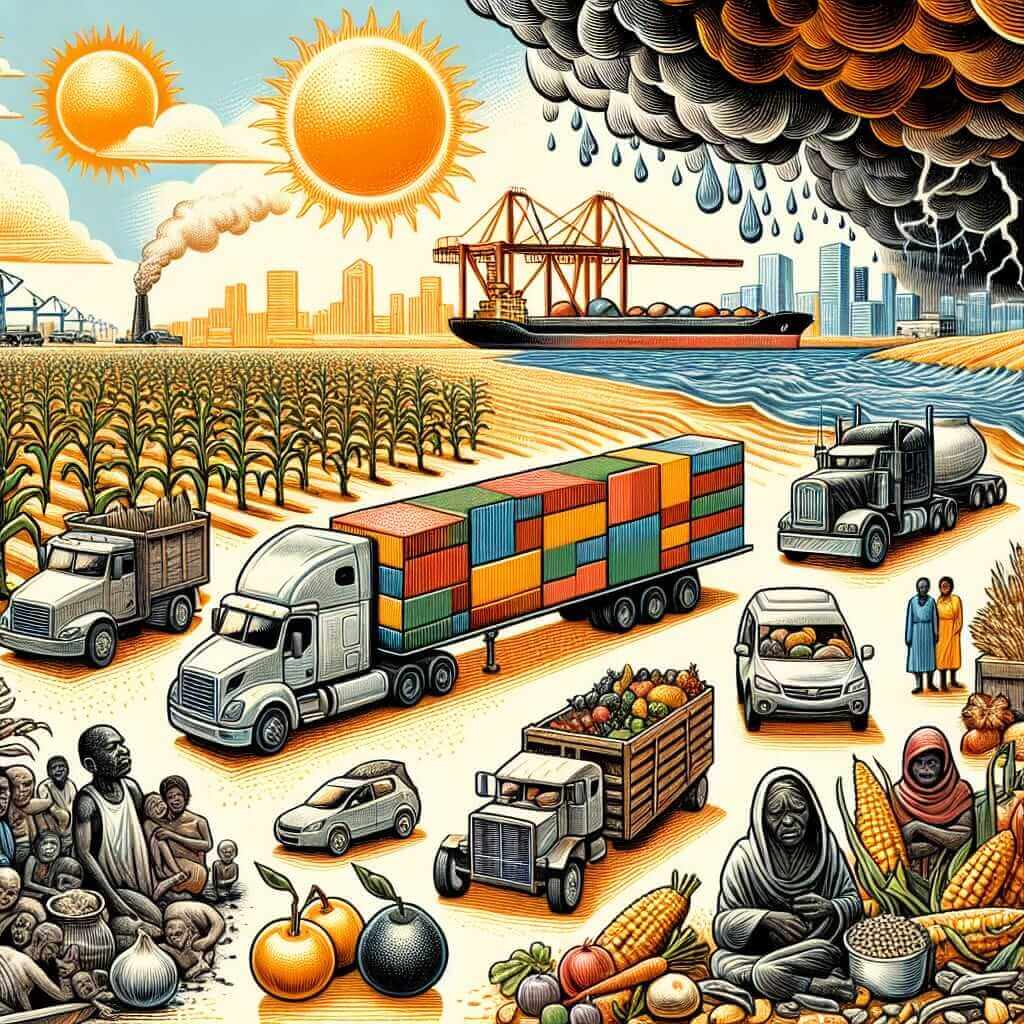The IELTS Reading test is an essential part of the examination and often includes passages related to current global issues, such as food distribution. ‘Challenges in global food distribution’ is a relevant and topical theme that has appeared in past IELTS exams and is likely to be featured again due to its global significance. This passage will provide practice for your reading skills, aligning closely with actual IELTS questions.
Main Content
IELTS Reading Practice Test
Text Type: Medium
Reading Passage
Global food distribution is a complex process that involves several stages, from farming and harvesting to processing and transportation. Despite advancements in technology and logistics, there are many challenges that impact the efficient distribution of food worldwide. These challenges can be broadly categorized into environmental, economic, and social factors.
Environmental Challenges:
One significant challenge is climate change, which affects crop yields, weather patterns, and soil fertility. Unpredictable weather conditions such as droughts, floods, and storms can devastate crops, leading to shortages and increased prices. Furthermore, global warming exacerbates these issues by altering ecosystems and biodiversity, making certain regions less suitable for agriculture.

Economic Challenges:
The economic aspects of food distribution are also problematic. High transportation costs due to fuel prices, tariffs, and taxes can make food expensive by the time it reaches the consumer. Economic disparities among countries further complicate the situation – wealthier nations can afford the technology and infrastructure necessary for efficient food distribution, while poorer countries struggle with limited resources.
Social Challenges:
Social factors play a crucial role as well. Political instability and conflicts can disrupt food supply chains, causing delays and shortages. Additionally, inequality within countries means that even when food is available, it is not always accessible to everyone. Poor infrastructure, corruption, and inadequate policy frameworks often hinder the fair distribution of food.
As the global population continues to grow, addressing these challenges will be essential to ensuring food security for all. Governments, international organizations, and private entities must work together to develop sustainable solutions for a more equitable food distribution system.
Questions
Multiple Choice Questions
-
Which of the following is NOT mentioned as an environmental challenge in global food distribution?
- A. Climate change
- B. Global warming
- C. Soil fertility
- D. Transportation costs
-
Economic challenges in food distribution are influenced by:
- A. High transportation costs
- B. Economic disparities
- C. Political instability
- D. Both A and B
-
Why are high transportation costs an issue in food distribution?
- A. They increase the cost of food for consumers.
- B. They affect soil fertility.
- C. They cause droughts and floods.
- D. They lead to the destruction of crops.
True/False/Not Given
-
Global warming is decreasing the number of regions suitable for agriculture. ____
-
Wealthier nations do not face any challenges in food distribution. ____
-
Poor infrastructure can hinder the fair distribution of food. ____
Matching Headings
-
Match the following headings with their respective paragraphs:
- A. Social Inequality
- B. Economic Disparities
- C. Environmental Hazards
- D. Future Solutions
Answer Keys
Multiple Choice Answers
- D
- D
- A
True/False/Not Given Answers
4. True
5. False
6. True
Matching Headings Answers
7.
- Environmental Hazards: Environmental Challenges
- Economic Disparities: Economic Challenges
- Social Inequality: Social Challenges
- Future Solutions: Conclusion
Common Errors to Avoid
- Misinterpreting Keywords: Ensure that you understand the context in which key vocabulary is used in the passage.
- Overlooking Details: Pay close attention to details that distinguish similar concepts, such as economic versus social challenges.
- Guessing Answers: Instead of guessing, refer back to the passage to verify your answers.
Vocabulary
- Crop Yields (n): The quantity of a crop produced on a piece of land.
- Weather Patterns (n): The meteorological conditions, including temperature, precipitation, and wind, that characterize a region.
- Ecosystems (n): A biological community of interacting organisms and their physical environment.
- Disparities (n): A great difference or inequality.
- Tariffs (n): Taxes imposed on imported goods and services.
Grammar Focus
-
Relative Clauses: “which affects crop yields, weather patterns, and soil fertility”
- Example: The drought, which devastated the crops, caused a severe food shortage.
-
Conditional Sentences: “If transportation costs rise, the price of food will increase.”
- Example: If global warming continues unchecked, many regions will become unsuitable for agriculture.
Conclusion
To score well in the IELTS Reading section, familiarize yourself with different types of questions and practice with passages on relevant topics like ‘Challenges in global food distribution’. Pay attention to details, expand your vocabulary, and practice interpreting complex sentences. For more practice, consider reading passages on related topics like food security and climate change and the influence of climate change on global food systems.
Good luck with your IELTS preparation!